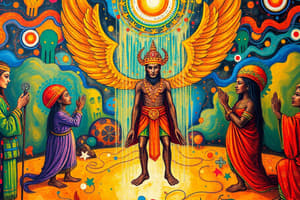Podcast
Questions and Answers
How do rituals contribute to society according to the text?
How do rituals contribute to society according to the text?
- Rituals help build social order, express emotions, and strengthen communal bonds (correct)
- Rituals have no significant impact on society
- Rituals only serve personal, not social, purposes
- Rituals are only relevant in religious contexts
How do religious beliefs and rituals influence individuals according to anthropological studies?
How do religious beliefs and rituals influence individuals according to anthropological studies?
- They shape how individuals interact with each other and view the world (correct)
- They have no impact on how individuals perceive reality
- They focus solely on personal rather than communal experiences
- They encourage individuals to isolate from society
What characterizes sacred spaces in religions?
What characterizes sacred spaces in religions?
- Sacred spaces serve as ordinary gathering places without any spiritual significance.
- Sacred spaces are primarily used for economic transactions within religious communities.
- Sacred spaces reflect the beliefs and rituals of religious communities and may include temples or churches. (correct)
- Sacred spaces often lack any symbolic representations or rituals.
What distinguishes identity from ethnicity in anthropology?
What distinguishes identity from ethnicity in anthropology?
Flashcards are hidden until you start studying
Study Notes
Anthropology is the scientific study of human societies and cultures and their development. This field encompasses various aspects of human existence, including beliefs and rituals in religion, cultural anthropology, ethnicity and identity, and sacred spaces in religious practices.
Beliefs and Rituals in Religion
Religion plays a significant role in shaping societal behavior and values. Anthropological studies have shown that religious beliefs and rituals often influence how individuals perceive reality and interact with one another. For instance, belief systems like Christianity, Islam, Hinduism, Buddhism, Confucianism, and Taoism all have unique rituals, symbols, and deities that shape followers' worldviews and daily lives.
Rituals serve numerous purposes in different religions. They can help establish social order, express emotions, promote healing, and strengthen communal bonds. In some cases, rituals also act as mechanisms for both personal and collective self-transformation, serving as rites of passage that mark significant life events such as birth, marriage, or death.
Cultural Anthropology
Cultural anthropology focuses on understanding and interpreting the patterns and processes of human culture. It examines the features shared within and between societies by studying language, social norms, human behavior, and economic systems. Cultural anthropologists often conduct fieldwork to gain firsthand knowledge of the people they study, immersing themselves in their daily lives to understand their beliefs, practices, and ways of thinking.
Ethnicity and Identity
Ethnicity refers to a person's cultural heritage or identity based on factors such as race, nationality, religion, language, or shared ancestry. Anthropological studies have shown that ethnicity is not strictly biological but rather socially constructed through various cultural practices and beliefs. This means that ethnic groups are defined not only by physical characteristics but also by shared customs, traditions, and values.
Identity, on the other hand, can be considered an individual's perception of who they are within societal contexts. It involves self-concept as well as how others categorize and treat individuals based on their perceived membership in certain social groups. Anthropology has made significant contributions to understanding identity formation by exploring its relationship with culture, politics, economics, and power dynamics.
Sacred Spaces in Religions
Sacred spaces refer to locations that hold spiritual significance for religious communities. These places may include temples, mosques, shrines, churches, synagogues, or burial grounds. The layout and usage of these sacred sites reflect the beliefs and rituals of the respective religions. For example, Buddhist temples often feature iconic statues or paintings representing enlightened beings, while Christian churches might contain stained glass windows depicting scenes from the Bible.
In some cases, sacred spaces serve as gatherings places where followers engage in communal activities like prayer, meditation, or festivals. They also provide opportunities for devotees to seek guidance from religious leaders or perform specific rites that promote personal growth and connection to the divine.
Cultural Diversity
Cultural diversity refers to the variety of different cultures found within and between societies. Anthropology helps us appreciate this rich tapestry of human experiences by highlighting both similarities and differences across various societies and historical periods. By fostering an inclusive understanding of diverse cultural practices and beliefs, anthropology contributes to promoting tolerance, empathy, and mutual respect among global populations.
In conclusion, anthropology offers valuable insights into the complex interplay between belief systems, ritual practices, cultural norms, identities, and sacred spaces. Through rigorous research and critical analysis, anthropologists contribute to our collective understanding of what it means to be human across time and space.
Studying That Suits You
Use AI to generate personalized quizzes and flashcards to suit your learning preferences.



